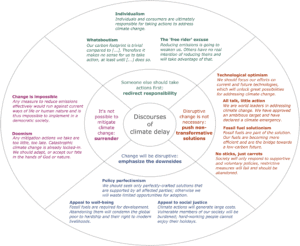“We may not know what lies ahead, but it’s only human to search for it.” – Chevron
This is the concluding sentence from a recent Chevron ad I saw. Seems innocuous. It’s lofty and inspirational and would likely slip past, except it raised my “cow waste” detector. Not many of us will recognize the ad as “greenwashing.”
We know what lies ahead for our children from a changing climate. Doesn’t anyone realize that it has reached 100 f’ing degrees above the Arctic circle? Or that 600 people died recently in a heat wave in British Columbia? Or that 30 million people in the US west are now running out of water from a permanent climate induced drought?
Of course you do. But the last sentence in the ad makes us feel like they (and we) are explorers, and that we don’t know what is going to happen. This is a frame. The idea that are many versions of the future so climate change may not be a threat.
The ad promotes Chevron’s “… working to find new ways forward through investments and partnerships in innovative solutions. Like renewable natural gas from cow waste, hydrogen-fueled transportation, and carbon capture.” Perhaps even their carbon capture will save us.
This is a little like a crack dealer offering organic meth for your health, or heroin dealer offering clean needles with every purchase and claiming to stop the spread of AIDs. (Imagery intentional.)
But here’s a problem. What if my anger and reaction in the second paragraph above is just what the ad and Chevron want? Doesn’t my reaction of doom elevate their half-baked solutions and simply delay meaningful actions on climate? The subtlety of this ad is that it works for most audiences even those against climate action. Together they form a frame similar to the old “Our country, love it or leave it.” A double bind. If we challenge the Chevron frame then we are against all these wonderful new things they are doing. If we accept it, then we are supporting the continued use of fossil fuels.
We can’t be successful with our climate communications without our own strategy. Otherwise we are just reacting. One of the first steps in establishing a strategy is a good assessment.
There are hundreds of these ads getting millions of views each day seeping into our soma-induced bliss, all funded by fossil fuel companies. They have moved away from a strategy of uncertainty and doubt, using the tactic of outright denial, to now fighting a war of delay through misinformation, partial truths, and appropriation of the the language of climate activism.
Bill McKibben, founder of 350.org says, “Winning slowly is the same as losing” on the climate crisis. So delay is their strategy. Their tactic is to push framing, and use the language of the climate advocates to weaponize our words against us.
For example, how many of you have bought “Blue Planet” gasoline? Or absorbed their good intentions…
- “Renewable natural” gas – Your gas company
- “Lower-emission solutions” – ExxonMobil
- “Developing our global strategy for creating sustainable energy…” – ExxonMobil
- “Advancing a lower carbon future” – Chevron
- “Accelerating the transition to lower net zero emissions” -Shell
- “Know your carbon footprint” – BP
You’d think they were leading our efforts against climate change. They are Greenwashing.
Our words matter. Both the ones we speak and write, as well as the ones we absorb. But understanding comes first from an assessment. How can we develop our own strategy without seeing what is being done to us?
The language of delay falls into four categories as outlined by a paper, Discourses of Climate Delay, published online by Cambridge University Press: 01 July 2020.
- Redirection of responsibility
I’ve said that we need massive collective and systemic action on climate. Yet by promoting individualism (i.e. Know your carbon footprint – BP above), fossil fuel companies are deflecting blame, placing responsibility on individuals and making you think that actions like composting will keep our polar icecaps from melting. Individual action is required, sets an example, and creates an identity for further action. But the main individual action is showing up civically to call on our governments and leaders to take action. - Pushing non-transformative solutions
I call this the Silver Bullet syndrome. When they promote ineffective or wildly distant solutions, they draw attention away from the actions and solutions we need to take now. I recently sat through an hour long webinar by a member of the American Petroleum Institute. The speaker concluded that the best solution was to put 14,000 nuclear reactors on barges in the ocean to capture carbon and sequester it in the form of an insoluble carbonate. I suppose we could also move the earth further from the sun. Has anyone thought of that? - Emphasizing the downsides
We are a risk averse species. We’d rather pay two dollars to avoid a one dollar loss, than invest a dollar to make two. So many of the arguments against climate action come framed in fear as “it costs too much.” We look at cost rather than investment because we discount the risk and emphasize the cost. Remember when they said wind turbines were too expensive. They are now the lowest cost form of energy. - Surrendering or adapting
Helplessness or doomism is also a key tool used by the fossil fuel industry and their PR gigolos. Climate doomism is a new form of climate denial. A corollary is that fossil fuel companies convince us that only they have the solution. Neither approach makes sense.
Here’s the Cambridge diagram that outlines fossil fuel tacts. It forms the basis of an assessment. It can help us ask… what is the “cow waste” narrative that we are facing and how can we pivot to our own narrative.

So this is not a rant against Chevron (well maybe a little bit), but rather a plea to those of us in climate communications who fail to see, and then call out the “cow waste,” or who, worse yet, echo or amplify it in our communications. We know that trying to negate a frame only strengthens it. We feed what we fight.
The question is what can we do about it. I go to my well warn top three.
- Stop using fear and facts as a motivator to convince people
- Pivot to our own strategies and narratives
- Tell more stories based on our values.
But to this I am going to add one more. Identify who the villains are, and why they are doing/saying what they are. For example, using the race class narrative format we can say:
- As Americans, no matter where we live, how we make a living, or the color of our skin, we all want clean air to breathe and a safe future for our kids. (Our values)
- But for too long, a few fossil fuel company execs, like crack cocaine dealers, have subtly drugged us into believing that climate change is our fault, or that they have some magic solution, or that it cost too much and there is nothing we can do. They create delay just so they can continue polluting our air, killing our children’s future and so they can maintain their obscene profits.* (Villains and Why)
- Imagine if we stopped believing them, and stopped burning their crap by switching to clean renewable energy as fast as possible. (Our solutions.)
- Join us now… insert call to action, and repeat our values.
Before we launch our next campaign, it makes sense to take time to assess how we’re being gaslit by fossil fuel companies. Lose the fact sheets by telling better stories and remember to identify their motivation. If you need help, just drop me a line. Thanks for all you do.
(* Chevron quadrupled profits of $1.4B from first quarter to $6.3B in first quarter 2022.)
Hobie,
‘We are all connected. Savor the Earth!’™
L. Hobart Stocking
SkyWaterEarth.com
hobart@skywaterearth.com
651-357-0110
Facebook: @SkyWaterEarthConnected
Twitter: @SkyWaterEarth








There has never been a real question about the eventual consequence of pumping carbon into the atmosphere — for well over a century science has been clear about this causing increasing temperatures on earth. Eventually hotter leads to hot as hell. Don’t wait for parasitic politicians or corporations to act — they want only to tell you what they think you want to hear — to get your votes and money. Stand up together against them, we are out of time.
This is a great article with great guidance for us all